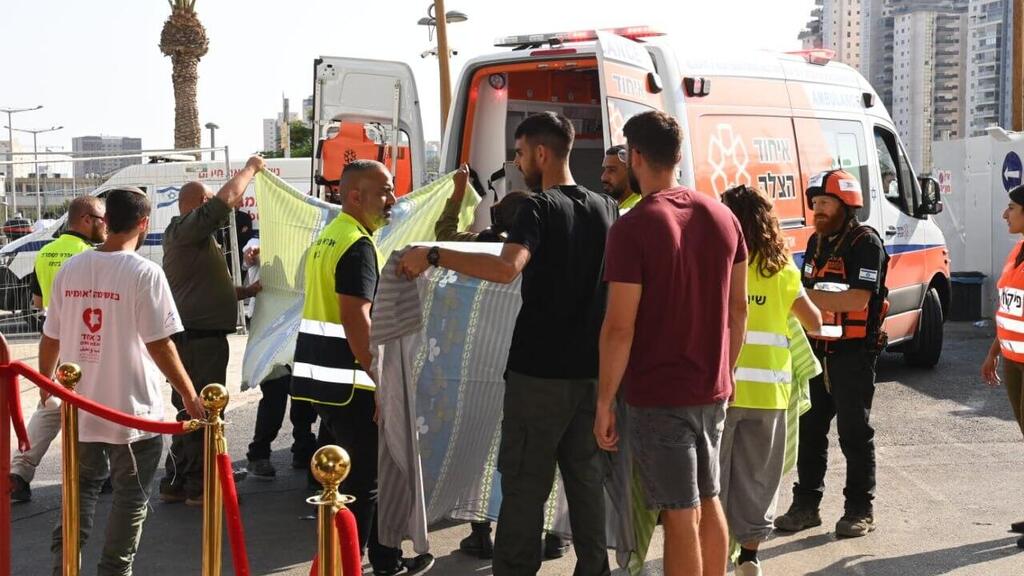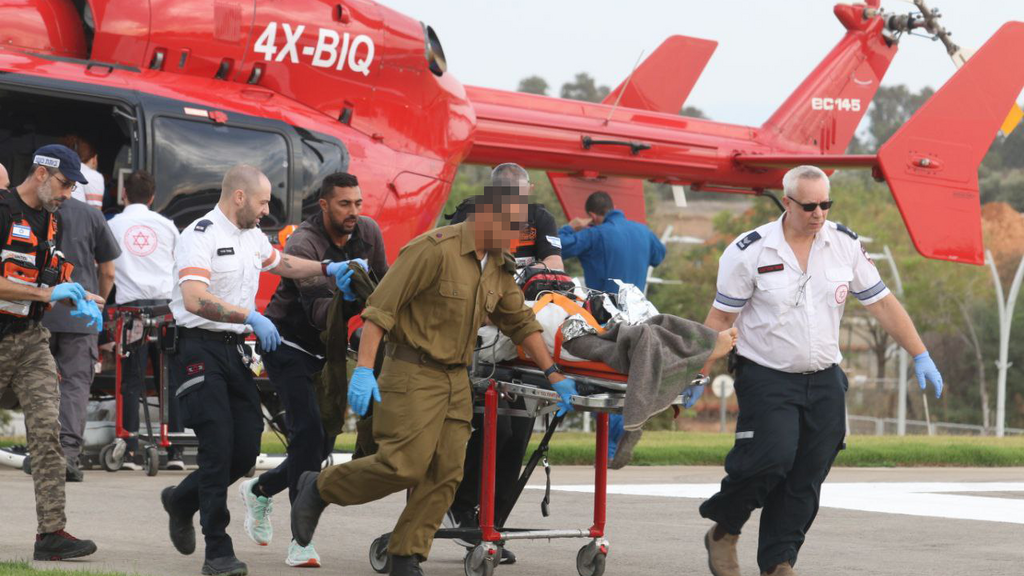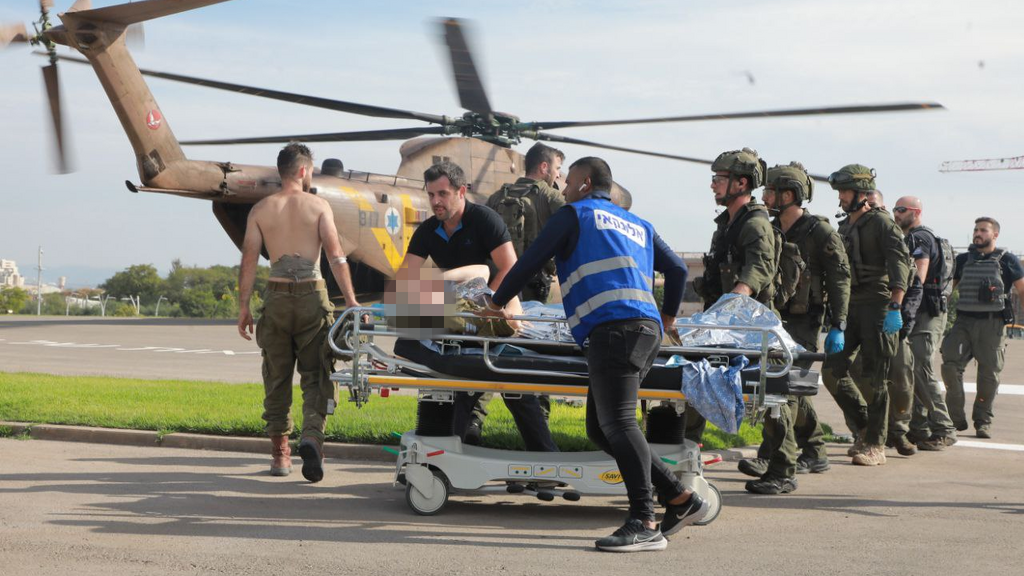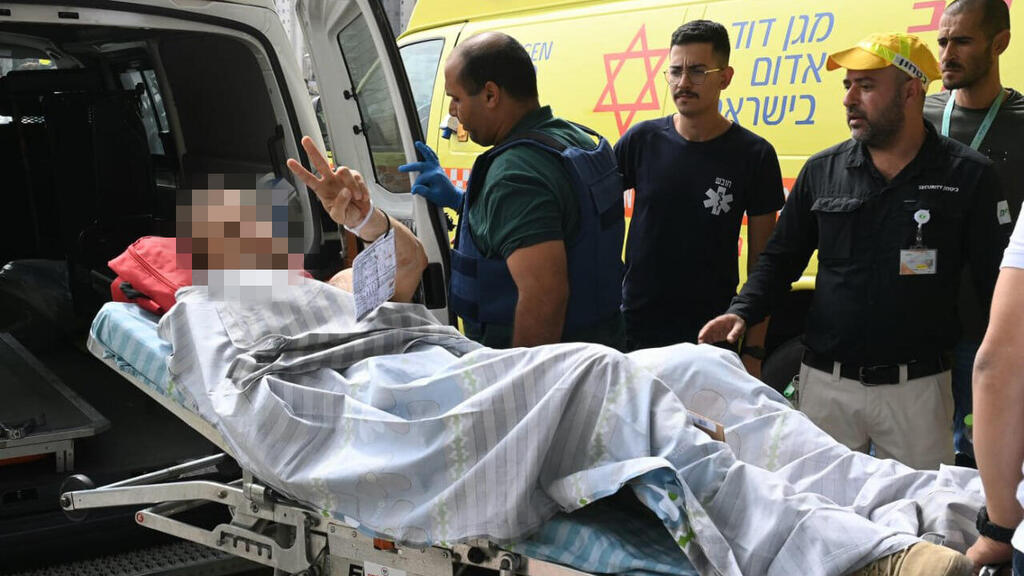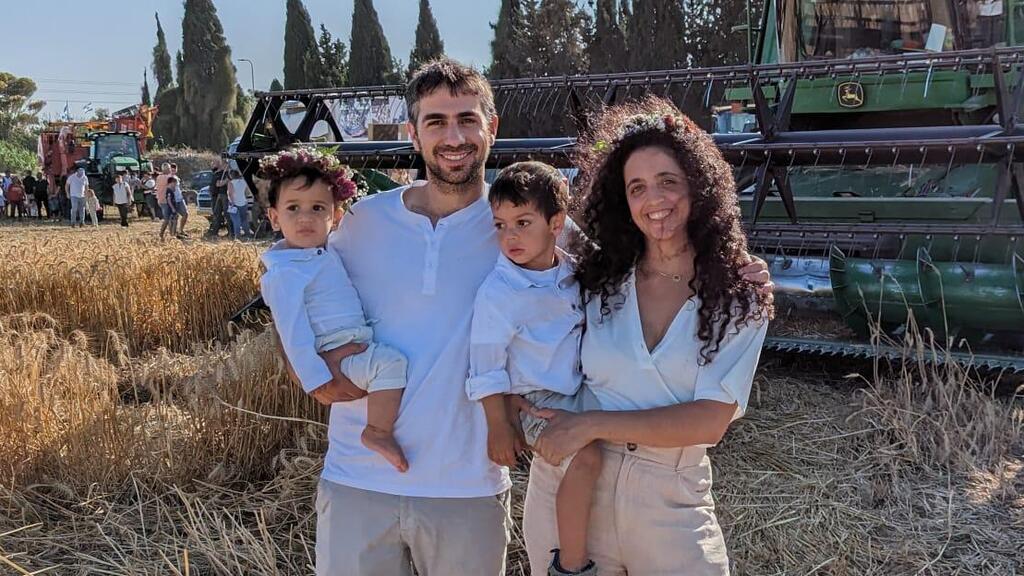Saturday, October 7. It's half past five in the morning, the 23rd hour of my first shift as a psychiatrist at Soroka Hospital in Be'er Sheva. I walk tiredly through the empty hospital lawns, feeling quite exhausted: It was the first time I was on shift alone, a busy shift, without one single moment of rest or sleep. I made myself a cup of tea, thinking about the rest of the day. In the afternoon there is a Sukkot celebration in my kibbutz, Erez, and I haven't made a cake yet. I wonder how the night went for Shaked, my husband, and the children, three-and-a-half-year-old Inbar and one-and-a-quarter-year-old Sahar. Their first night spent without me. The senior doctor in the emergency room tells me, "This shift seems like a jinx for you."
Read more:
6.29 A.M.
I see rocket alerts appearing on my mobile. I am in the empty emergency room, staring at the TV screen, watching the accumulating missile alerts. I sent Shaked a message and received no response. I'm texting also his mother. The number of alarms is unusual. Shaked finally answers, asking me to come home, as he needs to rush to the local standby alert squad. I ask among our group of interns if there's anyone who can fill in for me for an hour until the next shift arrives. Within a minute there's help.
I stand in front of the TV screen, and my anxiety increases. The other interns stand beside me, and I, as the "representative of the cities in the Gaza surrounding area" say, "It's not the alerts that scare us - we're already used to that - but rather the terrorists' infiltration." Within five minutes sirens start. The director of the ER, Dr. Dan Schwartzfox, arrives with a megaphone on his shoulder. I get the feeling that he also did not foresee the magnitude of the disaster.
7 A.M.
I already have the bag on my shoulder on the way to the car. The sirens in Be'er Sheva do not stop, which is very unusual compared to recent years. I'm sending a message to Sagit Levy, who is responsible for security in the kibbutz, asking if the roads are open and accessible. She answers me, "Don't go out." It was a short, concise message that probably saved my life. At the same time, my sister calls me continuously. "Don't go out of Soroka, there are terrorists all over the area," she says, and I don't understand. Within minutes, Shaked texts me that there have been shots fired inside the kibbutz and there's been infiltration by terrorists. The noise is unusual. My heart rate goes up to 200.
7.54 A.M.
I get a call from the kibbutz security headquarters: "Are you in the kibbutz? There are wounded, we need help." The brain refuses to believe. How many wounded are there? How come I'm not there? I, who throughout my military service taught soldiers to treat trauma victims, who for years taught students first-aid and trauma care - I'm not there when they need me when they need help. My frustration increases with every passing second.
At that time, I was already in the emergency room, which is still relatively quiet. A sense of 'calm before the storm'. I begin to understand that what I am about to see is beyond imagination.
This is my home, and I've never seen it like this before
At the entrance to the ER stands a former student of mine, a physiotherapist whose family lives in Kfar Aza. He tells me that he's here to help and can't stay at home alone. None of his family relatives answered his calls. Later it will turn out that his father was murdered while protecting his mother and nieces who survived the massacre.
The sirens continue to blare, and ambulances begin to arrive. The first to come out of the ambulances are the victims of the massacre at the music festival in Be'eri. Dozens of young people with gunshot wounds, so young and beautiful, who just a few hours beforehand were celebrating life, and now sitting in front of us, hollow-eyed. At the same time, dozens of injured police officers are pouring into the ER. The same policemen who only a few hours ago brought patients for my examination and asked me to hurry because they had to return to the station. The "lightly" injured are those suffering gunshot wounds to the extremities. I bring a bottle of water to a policeman who doesn't stop crying. He has "only" three bullets in his arm. He cries over his friend, who was killed next to him. He recounts that they were shot by an RPG and that there were dozens of terrorists at the police station in Sderot. He reiterates his request to go help others because he is fine. He "just" cries. His family arrives, and I move on to the next patient.
A soldier from the standby alert squad at the kibbutz arrives lying on a stretcher. He lies there, his body is folded, holding his gun, and screams when the doctors try to loosen up his body. He doesn't allow them to touch either his body or weapon. He is there in body but not in mind, which is still in the kibbutz.
A family from the Bedouin diaspora arrives at the ambulatory emergency room, where anxiety victims are brought. A rocket hit their house. The children suffered injuries and scratches. One of the family members was killed by the rocket. A boy. I take out of my bag a cookie that I saved for the morning tea, cut it in half and offer it to the children. The older girl cries and refuses to take it. Her brother convinces her that it's delicious chocolate, and she should take it. They sit on the floor and play in the crowded emergency room.
I raise my head and walk through the corridors of the familiar hall. I have been here for years, this is my home, I studied here, I worked here as a doctor's assistant and now as a doctor - and I have never seen it like this.
Hundreds of wounded, people with holes in their bodies and souls, sooty people in blood-soaked clothes. You can't get rid of the smell. Medical teams from all sectors work together, as one unit, in an inspiring way. Staff members arrived from their homes within seconds. The hospital manager, the ER manager, and anyone who could help was here. And they all worked together.
At some point, soldiers begin to arrive. Helicopters land every few minutes bringing wounded soldiers, bleeding, crying. A covered stretcher passes in front of me. You see only cold feet.
I didn't tell him I loved him
Meanwhile, as in a parallel universe - Shaked and my two children are besieged in the kibbutz. All Shaked's family and all my friends are there. The community that I love so much, everyone is trapped and afraid. I'm already beginning to understand the magnitude of the disaster. After every patient I see, I send Shaked a single word message "update". If he doesn't respond within minutes, I send a message to our neighbor, thinking that if the terrorists are at my house, and my family is dead, the neighbor will hear and be able to tell me.
10.29 A.M.
While treating a patient with anxiety attack after a missile hit her home, I saw an income call from Or-Yosef Ran, a team commander at Duvdevan military commando unit, my younger sister's ex-partner. I answer immediately. That was a short conversation, too short. He asks where we are, and if I'm okay. I answered that I was at Soroka Hospital, and Shaked was with the children in the shelter and I was worried sick. I tell him that there are terrorists in the kibbutz, and there are casualties. I try not to say too much because I'm close to a patient with anxiety and don't want to stress her further. He tells me that he's at the entrance to the kibbutz, 'taking care of them'." The conversation ends. I didn't say I loved him. I'm not even sure I told him to take care of himself. And that conversation, the last conversation I had with someone who would be murdered in a few hours - will stay with me forever, like this entire day will.
The ER continues to fill up. The feeling of madness intensifies. More and more doctors and therapists are coming. Teams ran to operating rooms, nurses ran between the beds, and triage nurses sorted the wounded.
It's almost two in the afternoon, and I realize I haven't eaten anything since yesterday. I'm extremely tired, feeling I can't take it anymore. I walk into the ER like a lion in a cage, feeling unbearable anguish. I go to the Eating Disorders department, where I normally work as a psychiatrist for hospitalized girls. I see my patients scared and worried. Many of them are from the cities that surround the Gaza Strip and Ashkelon. The hospital team set up a temporary dining room for them in a protected space, because these girls should not skip meals. It is an integral part of their treatment.
The girls sit and eat while fearing for their lives and worrying about their loved ones. I sit and eat next to them, and then I get the message: Amir Naim, a kibbutz member from the standby alert squad, a close friend of ours, has been murdered. I start crying and leave the room so as not to scare the girls. The heart is full of guilt and refuses to believe. What would have happened if I had been there? Maybe I could have saved him. I'm praying, asking to wake up from this nightmare.
We are refugees in our own country
I sit in my room and talk to the crying girls, trying to calm them down. Outwardly I am calm, inside there is a storm. Every minute that passes I fear the next message I will receive. Every minute that passes and there is no answer, I fear that I will not see my children again. My breasts, which are used to nursing my baby, Sahar, are aching, reminding me of the baby who hasn't eaten in hours, who is in the safety room with his father, an alert squad fighter who has been sitting there for 15 hours with a rifle and a bullet in the barrel, targeting at the entrance door of the safety room.
6 P.M.
38 hours after I started my shift, I got in the car. I understand that I am no longer useful. I can't see patients anymore; I can't contain the pain anymore. I hold the steering wheel and continuously cry. I understand that I have nowhere to go, I have no home, I have no idea when I will meet my family.
I go to my parents' house in Midreshet Ben-Gurion, where my little sister is. My parents are abroad. At some point, I understand that there are families from the kibbutz who managed to escape. I talk to Shaked, telling him that they need to escape. I'm afraid of what the night might bring. By a miracle, they manage to escape. The roads are full of terrorist groups, and there are a lot of bumps along the way, but they somehow manage to get out of the Gaza surrounding area.
At ten in the evening, Shaked and the children enter my parents' house. I run to them, hugging them not letting go. The children are running around the house, jumping on the sofas, releasing all the energies they have held the entire day - 15 hours spent in the safety room. Some families stayed dozens of hours in safety rooms until they were rescued. 20 refugees, Shaked's relatives, came to our house.
I would have liked to end my story with this. A happy ending. Our whole family managed to get out of the kibbutz safely. But this story has no happy ending. There is no end. period. We lie in bed; I hug Sahar tightly. He nurses ceaselessly. Shaked and I couldn't fall asleep. Thoughts are running through our heads. The distress can't be released. There is a terrible, burning, suffocating feeling.
The pain is intense. A pain I have never felt before. The reality is inconceivable. We, the people who live in the Gaza surrounding area, have become refugees in our own country. We don't know where and when we will return. Destitute, hollow-eyed, and a sadness that opens up like a pit that is getting deeper and deeper. Every day we receive another message about a family that was murdered, that was slaughtered. Another funeral. More crying. And we have to support ourselves, and we have to keep the children busy, and I have to go to work because they need me. The crying settles in my body, and in the brief moments of silence, it climbs up my throat and takes over me. The stories, the sights, the horrors. And I remember the words of the doctor in the emergency room, somewhere around six in the morning of that damned day: " This shift seems like a jinx for you." And I'm thinking: it was not just for me but for all of us.
Dr. Sapir Bitton specializes in child and adolescent psychiatry at the Department of Psychiatry in Soroka University Medical Center


